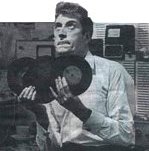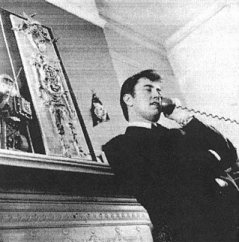|
The Beginning of the End |
||
|
Amazingly, Joe's reaction to this sudden crash and burn was to revive the all-but-dead Tornados. After a couple more lacklustre singles following Heinz's departure, and the total non-appearance of any royalties (with Ledrut still battling for his slice of Telstar Pie), the band had parted with Joe. A while later, a mysterious band calling themselves The Gemini released an instrumental, "Spacewalk", a copy of which was slipped through Joe's letterbox by persons unseen. Rumours in the business and the B-Side, "Goodbye Joe" gave him a few hints of who The Gemini might really be, at least in part. Only Clem Cattini was still prepared to give it a last shot, and so Joe teamed him up with a band from his hometown of Newent, The Saxons, with whom he'd made a couple of recordings before with no noticeable success. As Tornados '65, they released their best single since "Telstar", and, surely a coincidence, it just happened to be named "Early Bird", the name of the most recently launched American satellite. Good as it was, lightning didn't strike, and record buyers of 1965 weren't interested in instrumentals, even if Ritchie Blackmore did overdub some guitar parts. |
||
|
For the first time in almost ten years, Joe had virtually no prospects for a hit record, and yet it was during this period he did some of his finest work. The "RGM Sound" had come to fruition; unlike Phil Spector's "Wall of Sound", which is a solid sheet of noise hitting you all at once from the same place, the RGM Sound is more like a tapestry; even in mono, you can occasionally almost be fooled into thinking you're hearing a stereo recording because every single sound seems to have a different source and it is possible to pick out each part individually. |
|
|
|
Records by The Charles Kingsley Creation, The Syndicats, David John & The Mood - four of the best British freakbeat cuts of all time - even Heinz' later recordings, are all fine recordings and not entirely out of step with the times. The Riot Squad, whilst recording rather generic songs, still had exactly the right style and showmanship to be big hits. Glenda Collins' 1966 recording "It's Hard To Believe It" is possibly the culmination of the RGM Sound, with every one of Joe's little hallmarks, but perfectly understated and blended. The Cryin' Shames from Liverpool came the closest to the big time of any of the later bands Joe produced, and in fact their cover of the old Drifters song "Please Stay" did chart; in their home town it even hit No. 1 on a couple of local charts, but national is what was needed and they faltered before reaching the Top Twenty in most of the scattered ratings systems in effect then. |
||
|
The pace of Joe's work did not slow down; in fact, if anything, it increased. He would work through the night on something, fall asleep the next lunchtime and miss a session in the afternoon, booked months previously. The depression which had haunted him for years increased and finally started to overtake him. Anyone who knows how debilitating chronic depression can be, how erratic your behaviour becomes, how you lose desire to do some things you previously enjoyed and how things you had no interest in before suddenly become all important, will understand - and in 1960's Britain, the feeling was still prevalent that any kind of mental disorder led to madness. Either you were 'normal' or you were 'insane'. There was little help available. Music was Joe's life, hobby, job and career and it seemed to be slipping away from him. He was 35 years old. |
||
|
Working the phones in '66 |
By mid-1966 he had started to pull away from the few really good friends he could count on, another symptom of extreme depression. It seems that he was making some attempts to get some medical help for his problems, but treatment then was very hit and miss. No doubt he was caught in the "pill cycle" so common to performers and creative people; something to make you go to sleep at night, then something to eradicate the effects of the sleeping tablet the next morning so you could wake up and function properly. The standard treatments for depression included Lithium, Valium, Purple Hearts, heavy duty amphetamines and barbiturates... all now recognized variously as potentially or highly dangerous, and liable to do the sufferer more harm than good. |
|
|
The problems which had dogged him all his life, and which so many creative geniuses are doomed to fight or fail by, were catching up. Even back in the 1950's, he had been faced with the choice of leaving his family and everything he knew to go to London if he had any real hopes of pursuing his chosen career, and for a family oriented person like Joe, it was a hard choice. He had been successful, but never terribly popular, in the music business; he had bucked the system and They couldn't bear to have their apple cart upset. He had called the shots for a good few years, signing artists to himself and then offering a company a really good record for issue; he might sign a contract with Decca or EMI or Pye which agreed that the company would also release that artists next two or five or ten records, but they would pretty much have to take what he gave them, and if they didn't like it and failed to give it the publicity he wanted them to, he could pull the artist from their roster. They had many less "outs" than he; they couldn't refuse a song from a contracted artist because they didn't like it; if it wasn't badly performed and recorded (and Joe's recordings were very rarely "bad", though the material may have occasionally been poor), they couldn't refuse it because nobody could really say for sure what they public would buy and what they wouldn't. |
||
|
And there was his private life. Although Joe had had a few girlfriends in his youth, women weren't really to his taste. But to be homosexual in England before 1969 was not just a crime, not just a stigma even. In 1963 he had one of his scariest moment when chatting up a potential new friend who turned out to be an undercover officer for the Metropolitan Police Vice Squad. He was arrested and tried but there was very little the authorities could do; he received a small fine which amounted to little more than a slap on the wrist, and a conviction for the vague offense of importuning for immoral purposes, which is after all what millions of men do to millions of women every day in bars and on trains and at work. Still, he had the stigma of a permanent record and the fear that he would be "outed" to his mother, who he knew would be destroyed by the knowledge. In the end, even the media pretty much ignored it; a dozen lines or so in the early edition of a local paper was the sum total of his "outing". As several music industry bigwigs were also known to be homosexual, he wasn't exactly the only one; he had, however, been a little more open about it than some. Whether the reason was plain honesty, or simply defiance of being told how to live, his arrest stopped his personal candor spilling over into his business dealings. |
||

